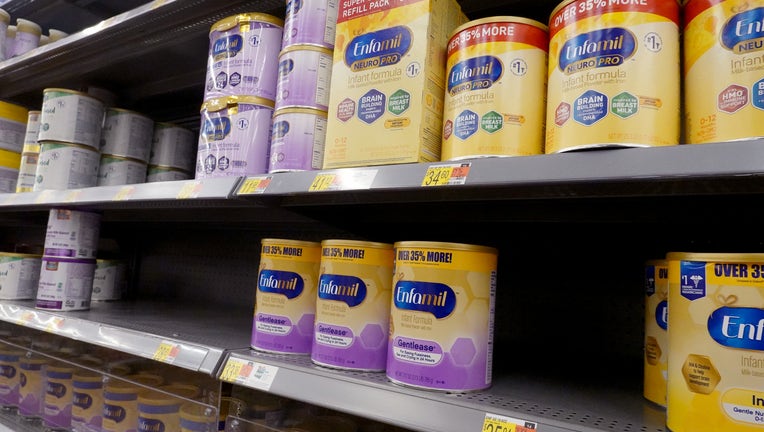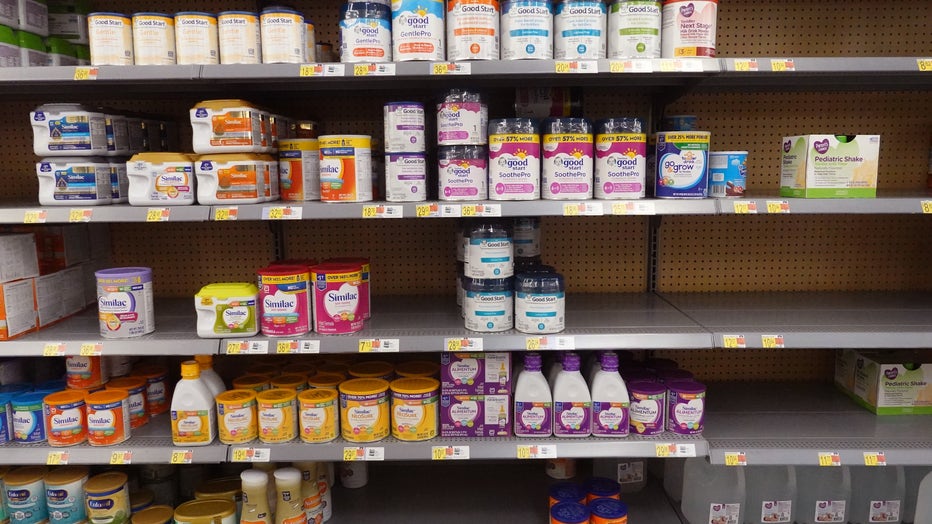Baby formula shortage: Stores limit sales as major brands sell out nationwide

CHICAGO, ILLINOIS - JANUARY 13: Baby formula is offered for sale at a big box store on January 13, 2022 in Chicago, Illinois. Baby formula has been is short supply in many stores around the country for several months. (Photo by Scott Olson/Getty Imag
A baby formula shortage fueled by supply chain issues and recalls is getting worse: Now, major retailers are limiting formula sales in response to high demand.
According to an analysis done by Datasembly, nearly 30% of popular formula brands were sold out nationwide in mid-March. In some cities, that number was higher than 50%.
CVS and Walgreens are limiting formula sales to three products per purchase in response to the shortage. A Target spokesperson said the company is "closely monitoring" the formula constraints and has some online sales limits in place.
FOX Television Stations also reached out to Kroger about their reported purchase limits, but hasn’t heard back yet.
RELATED: FDA: Abbott baby formula recall expanded to Similac PM after another report of illness
In a two-month period from January - March, the number of states where more than 30% of baby formula was sold out jumped from 11 to 24, Datasembly reports. As of March 13, about 29 percent of popular baby formula brands were sold out across the U.S., the analysis says.
Those numbers were more jarring in states like Minnesota, where the out of stock percentage for the week of March 13 was 54%. Connecticut, Hawaii, Iowa, Louisiana, Maryland, North Dakota, South Dakota, Rhode Island and Texas showed out of stock rates at 40% or more.
What’s causing the baby formula shortage?
Supply chain issues were already causing a run on baby formula when formula maker Abbott announced a major powdered formula recall in February. The products - powdered Similac PM, Similac, Ailmentum and Elecare formulas - were linked to several infant hospitalizations, including two deaths, due to a rare bacterial infection.

CHICAGO, ILLINOIS - JANUARY 13: Baby formula is offered for sale at a big box store on January 13, 2022 in Chicago, Illinois. Baby formula has been is short supply in many stores around the country for several months. (Photo by Scott Olson/Getty Imag
A subsequent FDA investigation concluded Abbott failed to maintain sanitary conditions at the Michigan manufacturing plant where the recalled formulas were made.
RELATED: Baby formula alternatives that haven't been recalled
FDA inspectors visited the same plant in late September 2021 and cited several problems, including unsanitary conditions, a lack of temperature controls, and employees who failed to sanitize their hands. But none of the problems resulted in a formal FDA warning or requirement that Abbott halt production.
Infections with the cronobacter bacteria are rare but can be fatal in babies. Almost all outbreaks reported in the U.S. have been linked to powdered baby formulas, which don’t undergo the same high temperatures used to kill germs in many other foods. Manufacturers have long said that it’s impossible to eliminate all bacteria from the formulas.
The recalled Abbott products can be identified by examining the coding on the bottom of each container. The affected formulas all have an expiration date of April 1, 2022, or later. The company has set up a website where parents can check if products have been recalled.
The Associated Press contributed to this report.

